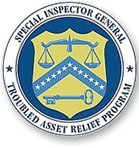Remember TARP (short for the Troubled Asset Relief Program)? Once upon a time it was a household word. While millions of Americans were losing their homes or unemployed or both, banks were lined up at the feeding trough collecting billions. That statement sounds a bit negative; we acknowledge that TARP may or may not have been a success depending on who you ask. Some say the big banks should have been allowed to fail. Some say that absent TARP, we would be in the midst of a full fledged depression.
Whatever your opinion, some banks admittedly abused the TARP program. There have been few prosecutions for TARP fraud, but that doesn’t mean that there is plenty of fraud taking place within banks.
Most banks have paid back the TARP monies they borrowed. In many instances, the government (meaning taxpayers) even made a small profit. Some banks still have not paid back the government, however.
Recently the deadline for repayment passed. That doesn’t mean the banks with outstanding TARP monies are in default, but it does mean that the cost of borrowing money increases dramatically. The government asked most TARP recipients to repay the money in 5 years. After that time, the interest on those funds spikes to 9%. Now that we are in 2014, there are but a handful of banks that still owe money and all should now be in the higher 9% interest category.
A list of some of those banks and what they still owe:
Sterling Financial Corp Washington $181 million
First Banks Inc Missouri $175 million
Pacific Capital Bancorp California $27 million (once known as Santa Barbara Bank & Trust, now owned by Union Bank)
Dickinson Financial Missouri $58 million (operates as Armed Forces Bank, Sun Bank and Academy Bank)
Central Pacific Financial Hawaii $60 million (Central Pacific Bank)
Anchor Bank Wisconsin $104 million (filed for bankruptcy)
Midwest Banc Holdings Illinois $89 million (closed by regulators)
Metropolitan Bank Grp Illinois $47 million (operates as Metropolitan Bank & Trust, LaSalle Bank, Archer Bank, First Midwest Bank)
Old Second Bancorp Illinois $41 million
First Place Financial Ohio $66 million (filed for bankruptcy, operated as First Place Bank)
Seacoast Bancorp Florida $1 million
Park Bancorporation Wisconsin $1 million (Park Bank)
Ridgestone Financial Wisconsin $1 million (Ridgestone Bank)
Baraboo National Bank Wisconsin $1 million
Bridgeview Bancorp Illinois $24 million
Farmers Capital Kentucky $3 million
Princeton National Illinois $23 million (shut down by regulators)
First Trust Corp. Louisiana $2 million
This list is believed accurate on the day it is posted. It is also incomplete. As of this date, there are dozens more banks that still owe the government.
There is a story behind each bank on this list. Some were small banks simply caught up in a regional downturn, others were far too aggressive with real estate loans. Some were and continue to be mismanaged. Some are now closed for good. And others still owe money because of fraud within the bank.
As one of the nation’s leading law firms for federal false claims act (whistleblower) cases dealing with lenders, banks and mortgage companies, we are interested in any story about fraud within a bank. Assuming the bank borrowed TARP monies, there may be a good case of TARP fraud and a corresponding false claims act case. Under the federal false claims law, whistleblowers can receive up to 30% of whatever the government collects. While the normal award is more like 20%, the federal law allows the government to obtain triple damages meaning a nice pay day for whistleblowers.
TARP fraud may also give rise to a case under the federal Financial Institutions Reform Recovery and Enforcement Act (FIRREA). That law allows whistleblowers to collect up to $1.6 million.
Even if no TARP monies were involved, mismanagement and fraud within a bank can often result in large whistleblower awards.
To qualify, whistleblowers must have original source information. This makes the law ideal for present and former workers within the banking industry.
Think you may qualify for a whistleblower cash award and need more information? Give us a call. All inquirers are confidential and protected by the attorney client privilege. For more information, contact attorney Brian Mahany at or by telephone at (direct). All inquiries are protected by the attorney – client privilege and kept in strict confidence.
Mahany & Ertl – America’s Fraud Lawyers. Services available in many jurisdictions.
Want more information? Our Due Diligence blog has a search engine located in the upper right hand corner. We have posted hundreds of informative articles on our site.


